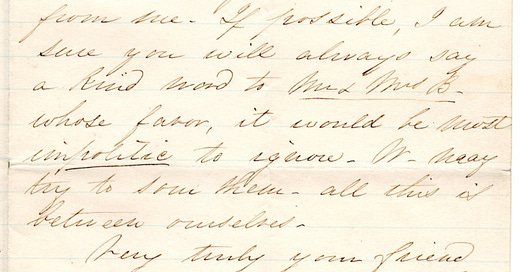Some of my earliest and most lengthy and detailed Substack posts related to Henry Wikoff. I have linked them below, as this post can only be understood in relation to them.
Mistaken Identities: Part I
A version of this article was published in the summer 2019 edition of Manuscripts. Part II will be published in the fall 2019 edition. Thoughts, suggestions, corrections and questions welcomed!
A brief summary of Wikoff in relation to the Lincolns:
“Henry Wikoff was a traveler, writer and amateur diplomat who was able to win favor with some of the leaders in Europe, particularly Louis Napoleon in France. Wikoff also had connections in the United States and was an associate of James Gordon Bennett. Wikoff's cosmopolitanism made him a favorite White House guest of Mary Todd. In late 1861 Wikoff telegraphed a portion of Lincoln's Annual Message to the New York Herald before it was sent to Congress. This caused quite a stir and resulted in Wikoff's banishment from the White House.”1
When I started studying Mary Lincoln, the way everything related to the Wikoff saga was distorted in the record drove me absolutely nuts. I started posting about her mainly to get all that straightened out.
Correcting the record involved arguing that her allusions to a “Mr W.” (or sometimes just “W.”) in correspondence with Abram Wakeman from 1864 and 1865 referred to Wikoff. As I explain in my previous pieces on the topic, since the 1940s or so, everyone who addressed the matter had assumed “Mr. W.” was politico Thurlow Weed.
I am very confident that Mary was alluding to Wikoff throughout this intrigue-filled series of correspondence, but my theory was somewhat undermined by the fact that one of the letters involved did make an explicit reference to Weed. In context, this did seem likely to be the same person referred to as “Mr. W.” in the rest of the rather cryptic letters.
I was recently notified, however, that this one letter, as published in the Turners’ Life and Letters book, contains a transcription error. The Turners have it listed as follows:
"If possible, I am sure you will always say a kind word to Mr & Mrs B[ennett] whose favor, it would be most impolitic to ignore–Weed may try to sour them–all this is between ourselves–"
An image of the actual letter shows that she actually wrote "W. may try to sour them." (My emphasis)
So we now know that there were zero explicit references to Weed in this series of letters, and I consider this discovery a vindication of my theory that the saga described in them involved an entirely different person: Henry Wikoff.
This transcription error came to my attention when I was helpfully contacted by independent historian Daniel W. Stowell, who had images of the actual letter and noticed the discrepancy.
In writing this post, I reviewed the second part of my Mistaken Identities series, and I wish I could feel as confident about the correctness of my theories as laid out in that piece, but I feel pretty strongly that I’m right about the “discarded menial” being Cornelius O’Leary and “E.” being Emerson Etheridge. Any thoughts on this from readers would be appreciated. I still have no clue who “Mr. G.” or “Monsieur Thomson” are, though. What a convoluted but intriguing series of letters!
Lincoln, Abraham. Abraham Lincoln papers: Series 1. General Correspondence. 1833 to 1916: Daniel E. Sickles to Henry Wikoff, Wednesday,Commission as a general. 1861. Manuscript/Mixed Material. https://www.loc.gov/item/mal1140000/.





